8 Aug 2018 | Campaigns -- Featured, Statements
[vc_row][vc_column][vc_column_text]
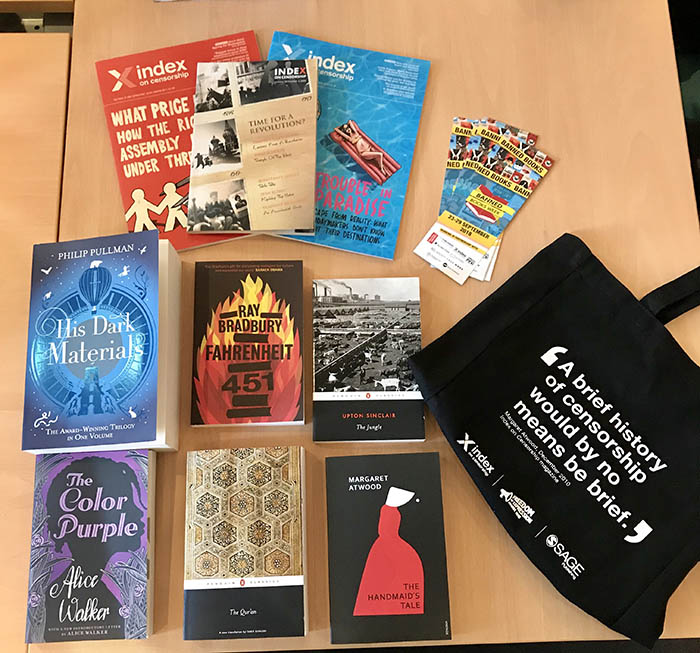
On Saturday, thugs damaged displays and threatened staff at a bookshop in London. At Index on Censorship, we believe reading broadens the mind and helps to create a more tolerant and inclusive society. So we’re sending some of the books we’ve been featuring ahead of next month’s Banned Books Week to those involved.
The books include The Jungle by Upton Sinclair, a book burned in the Nazi bonfires of 1933 because of Sinclair’s socialist views, as well as The Color Purple, The Handmaid’s Tale and a copy of the Quran. We’re sending them to UKIP, which has suspended the attackers as members, in the hope they will forward these on to them as something to read during their suspension.
If you’d like to help us raise funds to cover the costs of these books or support our work tackling censorship, please donate here, or feel free to send your own books to UKIP, whose address can be found here. You can support Bookmarks and Gay’s The Word, shops targeted in recent attacks.
[/vc_column_text][/vc_column][/vc_row][vc_row][vc_column][vc_basic_grid post_type=”post” max_items=”4″ element_width=”6″ grid_id=”vc_gid:1533803445742-e0453aac-0f94-6″ taxonomies=”9059″][/vc_column][/vc_row]
17 Aug 2015 | mobile, News and features, United Kingdom, Youth Board
This is the second of a series of posts written by members of Index on Censorship’s youth advisory board.
Members of the board were asked to write a blog discussing one free speech issue in their country. The resulting posts exhibit a range of challenges to freedom of expression globally, from UK crackdowns on speakers in universities, to Indian criminal defamation law, to the South African Film Board’s newly published guidelines.
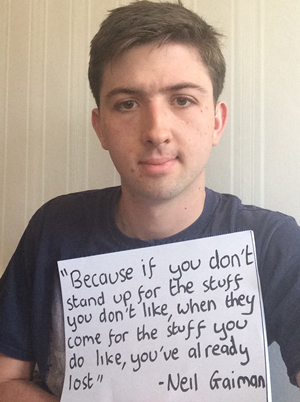
Tom Carter is a member of the Index youth advisory board. Learn more
Universities are meant to be institutions that embody the spirit of free expression. They are places where new ideas are formulated and environments where students are exposed to a range of viewpoints. However, whilst freedom of expression in universities is under threat from government intervention, another threat to freedom of expression on UK campuses is originating from the students themselves.
In October 2014, UKIP’s Nigel Farage was invited by the University of Cambridge’s politics department to give an address on an undisclosed topic. This prompted two independent Facebook campaigns, one of which was from the Cambridge University Students’ Union Women’s Campaign imploring Cambridge to rescind the invitation, which it eventually was.
This is indicative of an increasing hostility among UK students towards the expression of ideas deemed unacceptable. Whether or not you agree or disagree with UKIP’s policies, they are the UK’s third largest party by vote share and very much constitute part of the political mainstream.
The fact that students are now willing to influence the speaker choices of universities is a worrying trend. Only by hearing views different to your own can your ideas be refined and fine-tuned and hearing policies expressed in public discussion is the only way to scrutinise them effectively.
Tom Carter, UK
Related:
• Matthew Brown: Spying on NGOs a step too far
• About the Index on Censorship youth advisory board
• Facebook discussion: no-platforming of speakers at universities
15 May 2014 | News and features, Politics and Society, United Kingdom
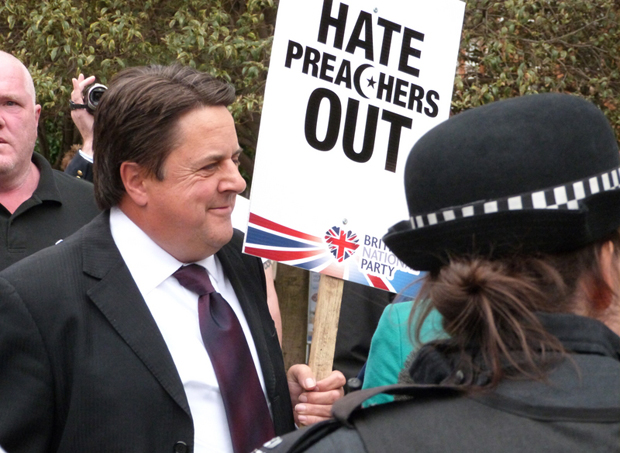
Nick Griffin, leader of the British National Party, arrives at a protest in June 2013 in Westminster. (Photo: Paul Smyth / Demotix)
BBC Radio Five Live’s Breakfast yesterday dutifully carried out its public service remit by interviewing Nick Griffin, the world’s most tedious Nazi demagogue, ahead of the European elections. Griffin’s British National Party does have some seats in the European Parliament, so is entitled to some airtime.
It was a dull interview. They always are. The BBC interviewers–in this case, Nicky Campbell–want to pick away at the BNP facade, but always somehow miss out on the really strange stuff. Long ago, I vowed that I would never write about Griffin without pointing out that he had written a pamphlet called “Who Are The Mindbenders?”, which is a catalogue of Jewish and Jewish people who work in the media. Griffin believes that these evil Jews (sorry, “Zionists”) are involved in an enormous plot to keep him–the saviour of the white race–out of the press and off the airwaves.
The conspiracist aspect of BNP policies is often overlooked, with the straightforward racism critiqued more heavily. So it was here. Campbell asked Griffin if he had a problem with black and mixed-race players representing England in the upcoming World Cup. Griffin, barely missing a beat, started complaining about BBC liberals smearing him and worse, denying him airtime.
“The BBC owes me 12 Question Times,” he declared, bemoaning his lack of invitations to appear on the BBC’s Thursday night festival of shouting from and at the telly.
It might have been interesting to delve into why Griffin felt he was being kept off Question Time, to see how long he would be able to maintain a line before going full Doctor Strangelove. As it was, we got only the superficial whine. The whine of the martyr-bully.
It is the background sound of our time. There is absolutely no one engaged in modern public life at any level at all who has not complained that they’ve been silenced, denied a platform, bullied into submission by a cruel cabal of agents of reaction or “the liberal agenda”, take your pick.
That is not to say people are not censored, even in the lovely modern 21st Century. It happens, quite a bit. People get locked up for saying stupid things on the internet that affront public sentiment. For years the libel laws restrained reporters, reviewers and the man on the Clapham Omnibus from saying what they really knew, or thought, or thought they knew. And no reader of this site needs to be told what happens in the less than democratic countries all over the world.
But there is actual censorship, and there is the claim to being censored, which are often two separate things. The BNP’s Griffin, UKIP’s Nigel Farage, and every Blimp all the way to Westminster delights in telling us, at length, the things that nobody, least of all them, is allowed to talk about anymore.
Meanwhile, on the left and the pseudo-left, there is an obsession with “platforms”; who has one, who deserves one, who is denied one. Editors and writers who do their best to represent as many diverse views as possible are denounced routinely for the articles they haven’t published rather than the ones they have. Every oversight is evidence of a conspiracy rather than a cock-up. The right people are always being excluded by the wrong people. If only, if only everyone shut up and let me speak, we think, then I could sort everything out.
It’s ironic that many of those who argue most vehemently that they are being censored are the exact ones who demand everyone else shut up. Intersectional feminists who insist they are being excluded from debate demand that radical feminists be “no platformed”. Ukipers who claim they’re not allowed talk about immigration want the police to arrest their opponents in anti-racist movements. All of them, simultaneously, noisily, will end up invoking Niermoller’s “First they came for…” (with the possible exception of the BNP, who, stopping short of displaying sympathy with Communists or Jews, instead content themselves with calling their opponents “the real fascists”, as I once heard Griffin do at Oxford Union).
Why is this? Why does everyone want to be censored?
It’s possible that the simple reason is that we are constantly improving as a society. Triumphalism and privilege are pretty much taboo for many. On the face of it, most of the people reading this, and certainly the person writing it, are probably the luckiest sons of bitches to ever have walked the earth. But a combination of our still-relevant horror at the great wars of the last century, plus a greater ability to learn about the ideas and experiences of others, make most of us wary of revelling in our role as the victor. Instead, we prefer to be the underdog, because underdogs are more virtuous–victims rather than perpetrators. Martyrs, even.
The Nazis and Communists of the 20th century also believed they were more sinned against than sinning, but the difference was that they were certain they would show the world who was really boss. Now, no one outside the most extreme movements – Al Qaeda; or North Korean Juche – really wants to state that aim openly. We want to remain oppressed. Censorship is considered almost universally as a bad thing, so people on whom it is inflicted are good.
The background whine of censorship, emanating even from the powerful may just be the tiny price we pay for a world that is generally better and kinder.
I think we can live with that.
This article was posted on May 15, 2014 at indexoncensorship.org
29 Nov 2013 | Academic Freedom, News and features, United Kingdom
In bid to address the issues surrounding people with extremist views giving talks at British campuses, Universities UK recently released new guidelines on external speakers. “Universities have to balance their obligation to secure free speech with their duties to ensure that the law is observed — which includes promoting good campus relations and maintaining the safety and security of staff, students and visitors,” says the body, which represents vice-chancellors.
This is not the first time they have spoken out about the topic. However, a set of guidelines from 2011 reads: “It is the law alone which can set restrictions on freedom of speech and expression and on academic freedom — it is for the law and not for institutions or individuals within institutions to set the boundaries on the legitimate exercise of those rights”. It appears they are calling for somewhat stricter regulation this time around. The current guidelines are also more in line with the view of the National Union of Students, which maintains that “(…) many students’ unions may wish to go further than the law on securing ‘freedom from harm’ when restricting some speaker activity.” The NUS’ own “No Platform” policy, banning certain speakers from their events, puts this theory into practice.
This is one of those topics that seems to come up at fairly regular intervals, and the outline of the debate is familiar by now. One side argues that speakers with outwardly hateful or discriminatory views don’t deserve a platform through which to legitimate them; while the other side argues that to deny them this is to deny them the right to freedom of expression, which also extends to those with whom we disagree. The following speakers have been responsible for at one point reigniting the debate, each in their own way.
1) Nick Griffin
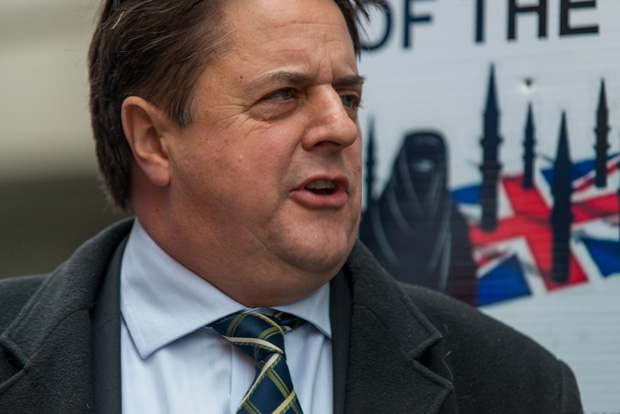
Nick Griffin outside the Old Bailey court on the first day of the trial of the murder of Lee Rigby (Image: Velar Grant/Demotix)
The most famous case in recent years was the 2007 appearance of BNP leader Nick Griffin (and Holocaust-denying historian David Irving) at an Oxford Union debate on free speech. The invitation caused massive uproar, with protesters picketing the event. “It is not just an Oxford issue, this will have ramifications for other places where the BNP are active… this is going to give legitimacy and credibility to their views,” said Student Union President Martin McClusky at the time. “I find the views of the BNP and David Irving awful and abhorrent but my members agreed that the best way to beat extremism is through debate,” argued Oxford Union president Luke Tryl. This is not only time the Nick Griffin has caused controversy as a potential university speaker. Trinity College Dublin cancelled plans to include him in a debate immigration, saying “it could not guarantee the safety and wellbeing of staff and students”.
2) Mufti Ismail Menk

Mufti Ismail Menk giving a lecture (Image: soukISLAM/YouTube)
Islamic preacher Mufti Ismail Menk spoke at Liverpool University earlier this month. He has previously stated that gay people are “filthy” and “worse than animals”. The event was initially reported to be part of a longer tour stopping at Glasgow, Leeds, Liverpool, Leicester, Cardiff and Oxford universities. However, all except Liverpool, where he was hosted by the Islamic Society, revoked their invitation or said he had not been officially invited in the first place. Liverpool responded that it is “not the role of the university to censor people’s views”.
3) Mohamed El-Nabawy
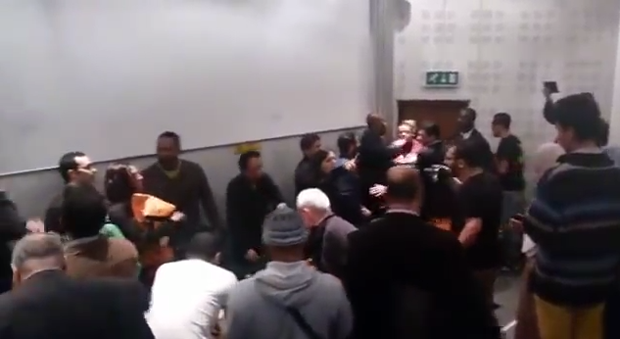
A video captured the protest that erupted when Mohamed El-Nabawy was due to speak at SOAS (Image: YouTube)
A representative of Tamaroud, the grassroots movement which played a significant role in the ousting of Egypt’s Muslim Brotherhood-backed elected government, was chased away by angry protesters prior to a scheduled talk at London’s School of Oriental and African Studies (SOAS). The protesters, who were not students, chanted and brandished posters associated with the Muslim Brotherhood at the open lecture. SOAS security had to escort El-Nabawy off campus using an emergency exit . A spokeswoman for the Palestinian Society, which had organised the talk, said: “In the pursuit of freedom of speech and expression, some people may find some of the views expressed at our events objectionable.”
4) David Gale
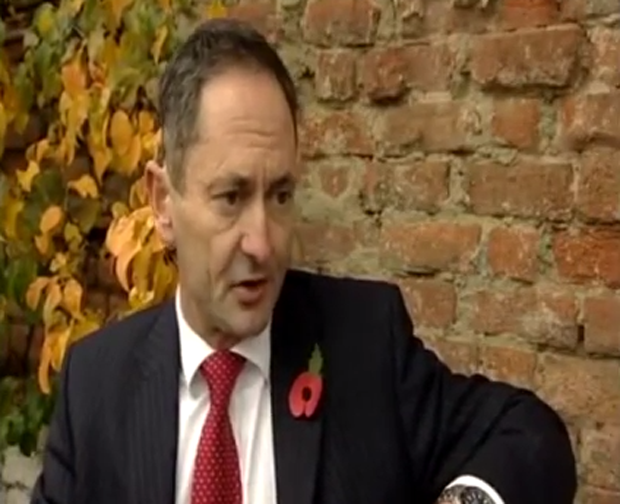
David Gale on the BBC’s Sunday Politics Show (Image: UKIPDerby/YouTube)
In 2012 the Student Union at the University of Derby banned David Gale, UKIP’s candidate for Police and Crime Commissioner, from taking part in a Q&A session at the university. The Union has a no platform policy for “individual(s) who they believe to be a member of a group with racist, fascist or extremist views”, a category the Union believed was applicable to UKIP . UKIP leader Nigel Farage weighed in on the issue at the time, saying: “It is frightening that a Derby student body is so frightened of free speech and public opinion.”
5) George Galloway
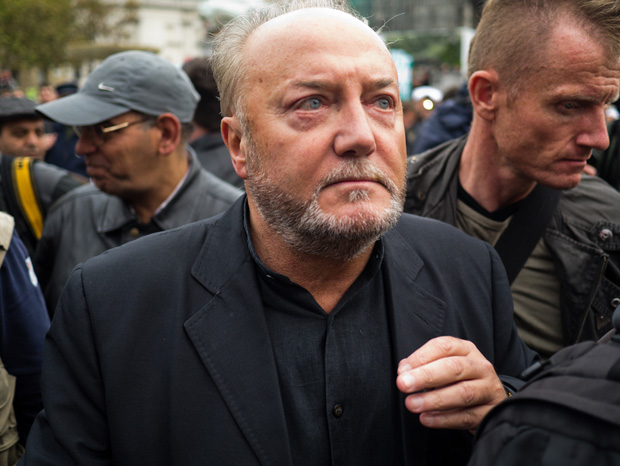
George Galloway attends an anti-war rally in 2011 (Image: Paul Soso/Demotix)
In March, George Galloway was set to speak at an event organised by the University of Chester Debating Society. However, the invitation was revoked by the Student Union, acting in line with the NUS’ No Platform policy on Galloway. This move came after the Respect Party MP was involved in a string of controversial incidents, including refusing to debate with an Israeli student at an Oxford University panel discussion. Galloway’s camp have called the policy “idiotic, anti-democratic and politically-motivated”.
6) Julie Bindel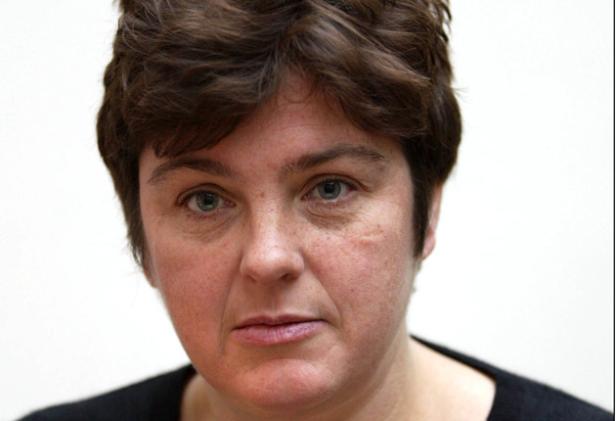
In September, the Debating Union at Manchester University (MDU) invited feminist writer and campaigner Julie Bindel to speak at their discussion on pornography. A number of people objected due to Bindel’s reported views about transexual people, which have led to the NUS implementing a No Platform policy for her. Some transexual students and their supporters “felt Julie Bindel’s transphobic statements and views made them both unwelcome at the event, and unsafe on campus, as it seemed that transphobia was being allowed and possibly encouraged,” said Loz Webb, the university’s Trans* representative. Despite this, MDU refused to replace Bindel, though she eventually chose to drop out after receiving death threats.
This article was originally posted on 29 Nov 2013 at indexoncensorship.org









